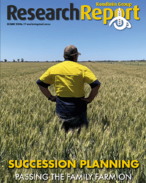This article is 2 years old. Images might not display.
Minister for Agriculture, Fisheries and Forestry, Murray Watt, announced the strategy yesterday at the National Press Club in Canberra.
Minister Watt said the National Biosecurity Strategy would provide clear direction to ensure the system remains fit to meet the challenges of the next decade and beyond.
"The management of Australia's biosecurity system is becoming increasingly complex, creating new challenges for governments, industry and community stakeholders in protecting our agricultural sector," the Minister said.
"Strong and efficient biosecurity is even more important as we respond to emerging challenges including diseases on our doorstep including Foot and Mouth Disease, African Swine Fever, Lumpy Skin Disease and Xylella.
"This strategy has been under development for more than a year and I'm really pleased that a new spirit of cooperation between Federal, State and Territory Agriculture Ministers has seen the strategy finalised and released so soon after the change of government."
National Farmers' Federation president, Fiona Simson, said the National Biosecurity Strategy was an important framework to ensure that all parts of the biosecurity system are best placed to protect Australia from an increasingly complex risk environment.
"A coordinated, well-resourced, and innovative biosecurity system is fundamental to the success of our agricultural industries, and in supporting the goal of becoming a $100 billion sector by 2030," Simson said.
Chief executive officer of the Invasive Species Council, Andrew Cox, said this was the first time that Australia would have a strategy that sets a direction for our national biosecurity system.
"It is a strategy that will help us protect the many things we value as Australians. I encourage all Australians to find ways they can support it," Cox said.
The Queensland government has also announced a renewed focus on biosecurity by recruiting a specialised squad of trained biosecurity officers to boost the state's frontline defences against outbreaks of Foot and Mouth and Lumpy Skin Diseases.
Queensland Premier, Annastacia Palaszczuk, said Queensland and Australia are facing unprecedented biosecurity risks and Cabinet, which met at the Ekka in Brisbane this week, was briefed on a more than $20 million package of initiatives to deal with the new threats including 15 new staff.
"This will be supplemented by an ongoing annual investment of almost $2.5 million to boost Queensland's existing capacity to address increasing biosecurity risks," the Premier said.
"At least $7 million will go to recruit and train a dedicated team of 10 new biosecurity officers."
Find out more about the National Biosecurity Strategy here:
www.biosecurity.gov.au/about/national-biosecurity-committee/nbs






















